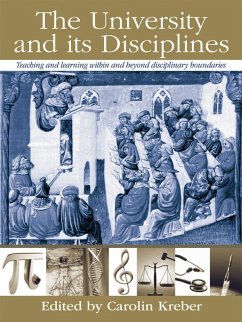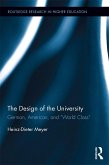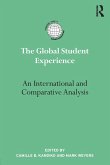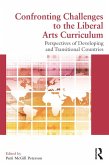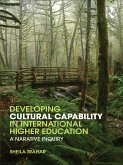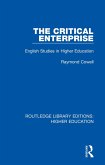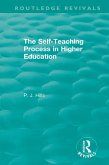The University and its Disciplines (eBook, PDF)
Teaching and Learning within and beyond disciplinary boundaries


Alle Infos zum eBook verschenken

The University and its Disciplines (eBook, PDF)
Teaching and Learning within and beyond disciplinary boundaries
- Format: PDF
- Merkliste
- Auf die Merkliste
- Bewerten Bewerten
- Teilen
- Produkt teilen
- Produkterinnerung
- Produkterinnerung

Hier können Sie sich einloggen

Bitte loggen Sie sich zunächst in Ihr Kundenkonto ein oder registrieren Sie sich bei bücher.de, um das eBook-Abo tolino select nutzen zu können.
University teaching and learning take place within ever more specialized disciplinary settings, each characterized by its unique traditions, concepts, practices and procedures. It is now widely recognized that support for teaching and learning needs to take this discipline-specificity into account. However, in a world characterized by rapid change, complexity and uncertainty, problems do not present themselves as distinct subjects but increasingly within trans-disciplinary contexts calling for graduate outcomes that go beyond specialized knowledge and skills. This ground-breaking book…mehr
- Geräte: PC
- mit Kopierschutz
- eBook Hilfe
- Größe: 2.58MB
![The Design of the University (eBook, PDF) The Design of the University (eBook, PDF)]() Heinz-Dieter MeyerThe Design of the University (eBook, PDF)36,95 €
Heinz-Dieter MeyerThe Design of the University (eBook, PDF)36,95 €![Challenging the Internationalisation of Education (eBook, PDF) Challenging the Internationalisation of Education (eBook, PDF)]() Lucy BaileyChallenging the Internationalisation of Education (eBook, PDF)40,95 €
Lucy BaileyChallenging the Internationalisation of Education (eBook, PDF)40,95 €![The Global Student Experience (eBook, PDF) The Global Student Experience (eBook, PDF)]() The Global Student Experience (eBook, PDF)34,95 €
The Global Student Experience (eBook, PDF)34,95 €![Confronting Challenges to the Liberal Arts Curriculum (eBook, PDF) Confronting Challenges to the Liberal Arts Curriculum (eBook, PDF)]() Confronting Challenges to the Liberal Arts Curriculum (eBook, PDF)33,95 €
Confronting Challenges to the Liberal Arts Curriculum (eBook, PDF)33,95 €![Developing Cultural Capability in International Higher Education (eBook, PDF) Developing Cultural Capability in International Higher Education (eBook, PDF)]() Sheila TraharDeveloping Cultural Capability in International Higher Education (eBook, PDF)45,95 €
Sheila TraharDeveloping Cultural Capability in International Higher Education (eBook, PDF)45,95 €![The Critical Enterprise (eBook, PDF) The Critical Enterprise (eBook, PDF)]() Raymond CowellThe Critical Enterprise (eBook, PDF)33,95 €
Raymond CowellThe Critical Enterprise (eBook, PDF)33,95 €![The Self-Teaching Process in Higher Education (eBook, PDF) The Self-Teaching Process in Higher Education (eBook, PDF)]() Pj HillsThe Self-Teaching Process in Higher Education (eBook, PDF)33,95 €
Pj HillsThe Self-Teaching Process in Higher Education (eBook, PDF)33,95 €-
-
-
Dieser Download kann aus rechtlichen Gründen nur mit Rechnungsadresse in A, B, BG, CY, CZ, D, DK, EW, E, FIN, F, GR, HR, H, IRL, I, LT, L, LR, M, NL, PL, P, R, S, SLO, SK ausgeliefert werden.
- Produktdetails
- Verlag: Taylor & Francis eBooks
- Seitenzahl: 272
- Erscheinungstermin: 15. Juli 2010
- Englisch
- ISBN-13: 9781135890353
- Artikelnr.: 42982975
- Verlag: Taylor & Francis eBooks
- Seitenzahl: 272
- Erscheinungstermin: 15. Juli 2010
- Englisch
- ISBN-13: 9781135890353
- Artikelnr.: 42982975
- Herstellerkennzeichnung Die Herstellerinformationen sind derzeit nicht verfügbar.
Chapter One: Supporting Student Learning in the Context of Diversity,
Complexity and Uncertainty, Carolin Kreber
Chapter Two: The Modern Research University and its Disciplines: The
Interplay between Contextual and Context-transcendent Influences on
Teaching, Carolin Kreber
Part II. Disciplines and their epistemological structure
Chapter Three (research-based): The Commons: Disciplinary and
Interdisciplinary Encounters, Janet Donald
Chapter Four (reactive): Academic Disciplines: Homes or Barricades?, Gary
Poole
Chapter Five (reactive): Hard and Soft - A Useful Way of Thinking about
Disciplines? Reflections from Engineering Education on Disciplinary
Identities, Bob Matthew and Jane Pritchard
Part III. Ways of thinking and practicing
Chapter Six (research-based): Ways of Thinking and Practicing in Biology
and History: Disciplinary Aspects of Teaching and Learning Environments,
Dai Hounsell and Charles Anderson
Chapter Seven (reactive): Exploring Disciplinarity in Academic Development:
Do "Ways of Thinking and Practicing" Help Higher Education Practitioners to
Think about Learning and Teaching?, Nicola Reimann
Chapter Eight (reactive): Opening History's "Black Boxes": Decoding the
Disciplinary Unconscious of Historians, David Pace
Part IV. Exploring disciplinary teaching and learning from a socio-cultural
perspective
Chapter Nine (research-based) : Guiding Students into a Discipline: The
Significance of the Teacher, Andy Northedge and Jan McArthur
Chapter Ten (reactive): Diverse Student Voices within Disciplinary
Discourses, Jan McArthur
Chapter Eleven (reactive): Guiding Students into a Discipline: The
Significance of the Student's View, Lewis Elton
Part V. Learning partnerships in disciplinary learning
Chapter Twelve (research-based): Educating Students for Self-authorship:
Learning Partnerships to Achieve Complex Outcomes , Marcia Baxter Magolda
Chapter Thirteen (reactive): Supporting Student Development in and beyond
the Disciplines: the Role of the Curriculum, Alan Jenkins
Chapter Fourteen (reactive): Constraints to Implementing Learning
Partnership Models and Self-Authorship in the Arts and Humanities, Vicky
Gunn
Part VI. Disciplines and their interactions with Teaching and Learning
Regimes
Chapter Fifteen (research-based): Beyond Epistemological Essentialism:
Academic Tribes in the21st Century, Paul Trowler
Chapter Sixteen (reactive): Exploring Teaching and Learning Regimes in
Higher Education Settings, Joelle Fanghanel
Chapter Seventeen (reactive): Teaching and Learning Regimes from within -
Significant Networks as a Locus for the Social Construction of Teaching and
Learning, Torgny Roxa and Katarina Martensson
Part VII. General observations on previous themes
Chapter Eighteen: Assessment for Career and Citizenship, Mantz Yorke
Chapter Nineteen: Teaching within and beyond Disciplinary Boundaries: The
Challenge for Faculty, Velda McCune
Chapter One: Supporting Student Learning in the Context of Diversity,
Complexity and Uncertainty, Carolin Kreber
Chapter Two: The Modern Research University and its Disciplines: The
Interplay between Contextual and Context-transcendent Influences on
Teaching, Carolin Kreber
Part II. Disciplines and their epistemological structure
Chapter Three (research-based): The Commons: Disciplinary and
Interdisciplinary Encounters, Janet Donald
Chapter Four (reactive): Academic Disciplines: Homes or Barricades?, Gary
Poole
Chapter Five (reactive): Hard and Soft - A Useful Way of Thinking about
Disciplines? Reflections from Engineering Education on Disciplinary
Identities, Bob Matthew and Jane Pritchard
Part III. Ways of thinking and practicing
Chapter Six (research-based): Ways of Thinking and Practicing in Biology
and History: Disciplinary Aspects of Teaching and Learning Environments,
Dai Hounsell and Charles Anderson
Chapter Seven (reactive): Exploring Disciplinarity in Academic Development:
Do "Ways of Thinking and Practicing" Help Higher Education Practitioners to
Think about Learning and Teaching?, Nicola Reimann
Chapter Eight (reactive): Opening History's "Black Boxes": Decoding the
Disciplinary Unconscious of Historians, David Pace
Part IV. Exploring disciplinary teaching and learning from a socio-cultural
perspective
Chapter Nine (research-based) : Guiding Students into a Discipline: The
Significance of the Teacher, Andy Northedge and Jan McArthur
Chapter Ten (reactive): Diverse Student Voices within Disciplinary
Discourses, Jan McArthur
Chapter Eleven (reactive): Guiding Students into a Discipline: The
Significance of the Student's View, Lewis Elton
Part V. Learning partnerships in disciplinary learning
Chapter Twelve (research-based): Educating Students for Self-authorship:
Learning Partnerships to Achieve Complex Outcomes , Marcia Baxter Magolda
Chapter Thirteen (reactive): Supporting Student Development in and beyond
the Disciplines: the Role of the Curriculum, Alan Jenkins
Chapter Fourteen (reactive): Constraints to Implementing Learning
Partnership Models and Self-Authorship in the Arts and Humanities, Vicky
Gunn
Part VI. Disciplines and their interactions with Teaching and Learning
Regimes
Chapter Fifteen (research-based): Beyond Epistemological Essentialism:
Academic Tribes in the21st Century, Paul Trowler
Chapter Sixteen (reactive): Exploring Teaching and Learning Regimes in
Higher Education Settings, Joelle Fanghanel
Chapter Seventeen (reactive): Teaching and Learning Regimes from within -
Significant Networks as a Locus for the Social Construction of Teaching and
Learning, Torgny Roxa and Katarina Martensson
Part VII. General observations on previous themes
Chapter Eighteen: Assessment for Career and Citizenship, Mantz Yorke
Chapter Nineteen: Teaching within and beyond Disciplinary Boundaries: The
Challenge for Faculty, Velda McCune
